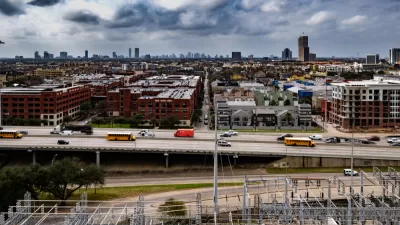Trends pre-dating Covid-19 showed housing affordability slipping away from many residents in Texas. The pandemic will likely only exacerbate the trend, according to this analysis.

William Fulton writes about an ongoing shift in the housing market, dating back previous to the coronavirus outbreak in the United States, that threatens to end one of the economic advantages of Texas—housing affordability.
Texas has a reputation as an affordable place to live — largely because the cost of housing is much less than on the coasts. But the truth of the matter is that housing in Texas is gradually becoming less affordable — especially in the large metropolitan areas where virtually all of the population and economic growth is taking place. And that trend could prove to be a brake on Texas’ economic growth down the road.
The team at the Kinder Institute pulled data from the Joint Center for Housing Studies at Harvard University's State of the Nation’s Housing 2019 report to inform analysis of the housing market in Houston, producing a few big take-aways, with more detail in the source article:
- The state’s housing problem is concentrated in the Triangle
- The rate of homeownership in large Texas metros lags behind the nation
- The ratio of home price to income is rising in Texas
- Renters are cost-burdened and their options are dwindling
While the analysis looked at the pre-Covid housing market in Texas, some experts are predicting that the housing market will be out of reach for more Americans due to high unemployment, further reducing access to affordability in cities all over the country. Fulton predicts that similar trends in Texas will likely hasten the trends identified in the report.
Fulton also notes that the solution to Texas' housing affordability concerns vary depending on political affiliation. "For conservatives, the most important policy issue has been property taxes," according to Fulton, while liberals call for "significant government interventions similar to those used in the 'blue' states and metros on the coasts."
FULL STORY: Can Texas afford to lose its housing affordability advantage?

Alabama: Trump Terminates Settlements for Black Communities Harmed By Raw Sewage
Trump deemed the landmark civil rights agreement “illegal DEI and environmental justice policy.”

Study: Maui’s Plan to Convert Vacation Rentals to Long-Term Housing Could Cause Nearly $1 Billion Economic Loss
The plan would reduce visitor accommodation by 25% resulting in 1,900 jobs lost.

Why Should We Subsidize Public Transportation?
Many public transit agencies face financial stress due to rising costs, declining fare revenue, and declining subsidies. Transit advocates must provide a strong business case for increasing public transit funding.

Paris Bike Boom Leads to Steep Drop in Air Pollution
The French city’s air quality has improved dramatically in the past 20 years, coinciding with a growth in cycling.

Why Housing Costs More to Build in California Than in Texas
Hard costs like labor and materials combined with ‘soft’ costs such as permitting make building in the San Francisco Bay Area almost three times as costly as in Texas cities.

San Diego County Sees a Rise in Urban Coyotes
San Diego County experiences a rise in urban coyotes, as sightings become prevalent throughout its urban neighbourhoods and surrounding areas.
Urban Design for Planners 1: Software Tools
This six-course series explores essential urban design concepts using open source software and equips planners with the tools they need to participate fully in the urban design process.
Planning for Universal Design
Learn the tools for implementing Universal Design in planning regulations.
Smith Gee Studio
Alamo Area Metropolitan Planning Organization
City of Santa Clarita
Institute for Housing and Urban Development Studies (IHS)
City of Grandview
Harvard GSD Executive Education
Toledo-Lucas County Plan Commissions
Salt Lake City
NYU Wagner Graduate School of Public Service




























